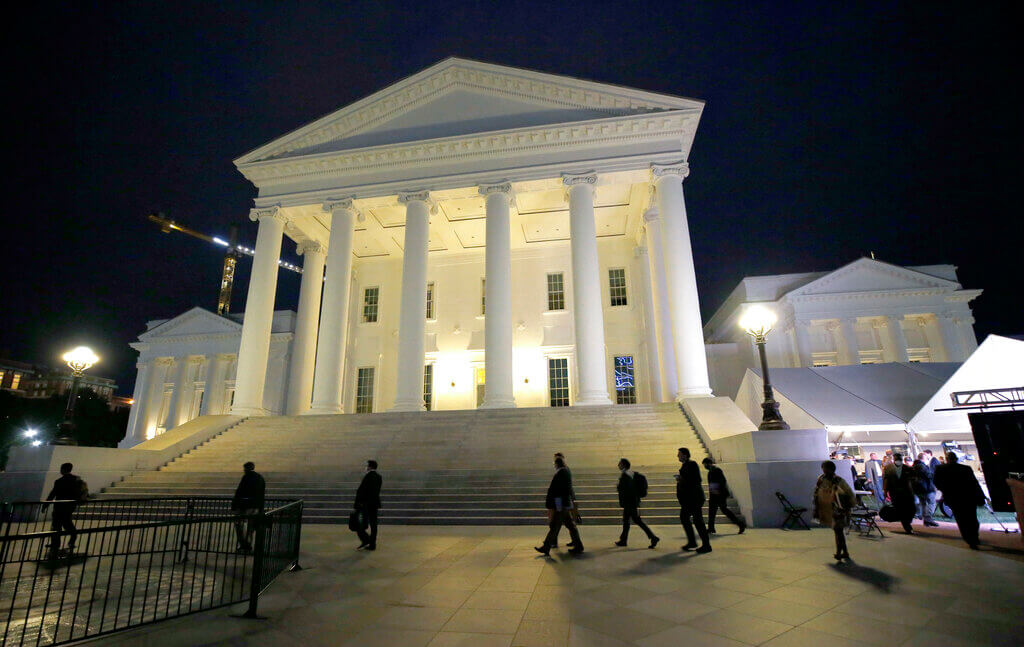
Virginia State Capitol in Richmond, Va. (Bob Brown/Richmond Times-Dispatch via AP, Pool)
Only a limited number of bills will get through the 30-day session, due to restrictions.
RICHMOND-The number of bills Virginia lawmakers can propose during the upcoming General Assembly session has been cut in half.
Delegates will be limited to proposing seven bills over the January session, down from 15. Senators can only propose 12 bills, down from an unofficial limit of 25 each.
“The House of Delegates has always had a bill limit for these shortened sessions since 2009. Historically, it’s been 15 bills,” said Sen. Scott Surovell (D-Fairfax). “In the Senate, we didn’t have a bill limit until two years ago. It was 25, although it was never in writing. It was an informal limit that leadership communicated and everyone lived by.”
According to Democrats in the General Assembly, limitations on the number of bills members can propose are a result of the minority parties’ decision to shorten the session.
Session Length Limited
Last week, Republican leaders in the General Assembly said they would not support extending the upcoming session beyond 30 days.
“We serve a state of eight million people. And the minority party wants us to do that business in 30 days. The laundry list of things we need to cover, from the climate crisis to public education to paid sick leave, there’s no shortage of problems that need fixing,” said Democratic Del. Sally Hudson (D-Charlottesville).
The Constitution of Virginia limits sessions on odd-numbered years to 30 days or less. However, these sessions have historically been extended to at least 46 days.
“The constitution technically provides that a legislative session in the odd years can run just 30 days. But I think everyone knows that is not enough time to conduct the business of the Commonwealth,” Hudson said.
You need two-thirds of both Chambers to vote in favor of extending the session before it can be lengthened. Without Republican support, the majority party can’t keep the Capitol open later than February 12, 2021.
There were no limits on the length of the 2020 special session, which met for a total of 84 days. According to members of the Assembly, the extended length of the special session was in part due to technological issues.
“It’s more difficult to conduct our business remotely,” said Del. Hudson.
The House of Delegates will once again meet remotely for the 2021 regular session, which begins January 13. The Virginia Senate, meanwhile, will meet in person, as they did for the special session.
Lawmakers Need to Narrow Priorities
Virginia legislatures will have to narrow their priorities for the upcoming session to accommodate limitations on the number of bills they can propose.
Beyond the new bill limit, there’s another number to consider. Currently 385 bills and resolutions are sitting in committee, “continued” to 2021. That doesn’t mean any of them will get a vote in the next session. In fact, there’s no guarantee they’ll be heard at all. Under General Assembly rules, committees have to vote to either move a current bill forward or let it die by midnight on Dec. 3.
If even one third of those bills make it to January, that loads down an already full schedule for the Assembly, before any new bills even enter the conversation.
Recognizing that limit has led to frustration for local cities and counties. Typically at this time of year, localities outline their wish list of sorts, things they want the General Assembly to focus on in the next session. But faced with a short schedule, it’s a very real possibility most requests will have to wait until 2022.
On Friday, Sen. Creigh Deeds (D-Bath) explained that to the Albemarle County Board of Supervisors.
“It’s going to be very difficult for any of us to add anything to what we’ve already committed to do,” Deeds told the board.
For now, Surovell says he expects the Democratic Party to prioritize legislation related to marijuana legalization and criminal justice reform.
“I’ve seen some discussion about marijuana legalization. So I’m sure we’re gonna have some discussion about that. There are some larger form criminal justice reform issues that we deferred in the special session. There are some complexities we need to look at like mandatory minimum sentencing, death penalty, parole, qualified immunity, expungement,” said Surovell.
The next General Assembly session starts Jan. 13.
Politics

Biden administration bans noncompete clauses for workers
The Federal Trade Commission (FTC) voted on Tuesday to ban noncompete agreements—those pesky clauses that employers often force their workers to...

Democratic shakeup in Virginia primaries for governor, lieutenant governor
Richmond Mayor Levar Stoney quit his bid for governor and jumped into the race to be the Democratic nominee for lieutenant governor. The race for...
Local News

The zodiac signs of 12 iconic women offer insight into their historic accomplishments
Zodiac signs can tell you a lot about someone’s personality. Whether they’re an earth, water, air, or fire sign, these 12 categories (which are...

Virginia verses: Celebrating 5 poetic icons for National Poetry Month
There’s no shortage of great writers when it comes to our commonwealth. From the haunting verses of Edgar Allan Poe, who found solace in Richmond's...




